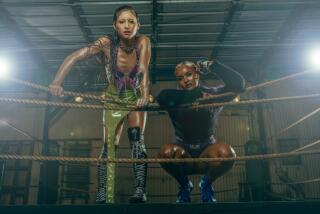SHAKING THE FAMILY TREE
- Share via
LAS VEGAS — Freddie Roach had a dream. He wanted to be an arborist.
Yes, the same Freddie Roach who became a colorful lightweight and is now one of the most successful trainers in boxing. He is working with 11 major fighters, including Manny Pacquiao, who will fight Erik Morales Saturday night at the Thomas & Mack Center.
But when he was a kid in Massachusetts, Roach detested boxing. He was more interested in the trees in his backyard.
Literally.
Roach’s father, Paul, was in the tree business, cultivating them, cutting them down or just trimming them. Growing up, Freddie worked for his father. When he was 10, Freddie was using an ax. At 12, he had a power saw. At 16, Freddie got his first pair of climbing spikes from his father.
There were learning experiences. Once, when Roach was helping cut down a tree, it fell the wrong way, crashing onto the customer’s patio.
Roach went to an agricultural school to learn his trade. By the time he’d graduated, Roach could identify 50 trees by their English and Latin names, could pinpoint which trees were susceptible to which diseases, and was knowledgeable about the uses and limitations of a vast array of gardening hardware.
“I could see my future there,” Roach said. “I wanted to start my own forestry company.”
But although his father had been invaluable in teaching Freddie the business, Paul was more interested in seeing his son go into another branch of the family business, boxing.
Paul had been the New England featherweight champion in 1947 and he wanted his five sons to follow him into the ring. Paul put gloves on Freddie when he was 6.
“I hated boxing,” Freddie said. “But I did it to keep my father happy. He could be mean when he wasn’t happy. My oldest brother, Al, quit boxing when he was 14. He got thrown out of the house when he was 15.”
Ultimately, it was not his father, but his mother, Barbara, who changed Freddie’s opinion of boxing. When Freddie was a teenager, he faked an illness to avoid the gym one day so he could go see a girl.
When his mother caught him, she asked Freddie, “Why are you fighting anyway? All you do is catch punches.”
His pride hurt worse than his body had ever been, Freddie decided to show his mother he could do more than catch punches. He became a successful amateur fighter.
But tree trimming paid the bills. After one particular close call, though, Roach had second thoughts. As he worked in the upper reaches of a tree, the chain saw he was using bucked and slammed him in the chest. Fortunately, it was the handle-motor part of the saw that hit him, rather than the chain blade.
“I thought I had bought it that day,” Roach said.
He decided that maybe boxing wasn’t so bad, taking the $300 he earned from the job and heading west to resume his ring career.
With his father accompanying him, Roach wound up in a Las Vegas gym where a trainer saw enough potential in Roach to work with him. The trainer was the legendary Eddie Futch.
In a nine-year career, Roach had sporadic success, winning 39 fights and losing 13. His last match was in Lowell, Mass., where he lost a majority decision to David Rivello.
“During the fight,” Roach told publicist Lee Samuels after the match, “I was asking myself, ‘Why am I hitting this guy? He’s not a bad guy. I don’t want to hurt people anymore.’ ”
Said Samuels, “That’s when I knew the spark had gone.”
Roach’s father was not so understanding. “What happened to you?” he asked his son. “You go from being so good to this?”
Freddie responded with a profanity and stormed off, never to patch up the relationship with his father. Turning his back on boxing at 26, Roach wasn’t sure where to turn.
“I was bitter,” he said. “I had put my whole life into this sport and had gotten nothing out of it. I wanted to be a champion and I failed.”
Roach returned to Las Vegas, tried telemarketing, worked as a busboy, drank heavily and gained 40 pounds. The tree business was no longer an option.
“They had palm trees in Las Vegas,” he said. “I didn’t know much about palm trees.”
Eventually he found his way back to the gym where he had begun his professional life, back to Futch.
Futch took Roach on as an unpaid assistant. But Roach soon got his own clients, the list growing as did his reputation. Eventually some of the most recognizable names in the sport hired him, from Mike Tyson and James Toney to Johnny Tapia and now Pacquiao.
“Sometimes I wonder what would have happened if I had taken the other path,” Roach said. “If I would have become an arborist, an ordinary working stiff with a wife and kids.”
But he doesn’t wonder for long.
“I have a great life,” he said. “Who wouldn’t want to change places with me?”
More to Read
Go beyond the scoreboard
Get the latest on L.A.'s teams in the daily Sports Report newsletter.
You may occasionally receive promotional content from the Los Angeles Times.










